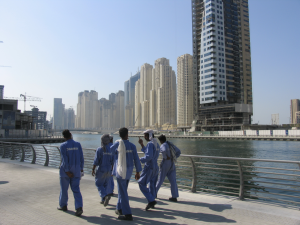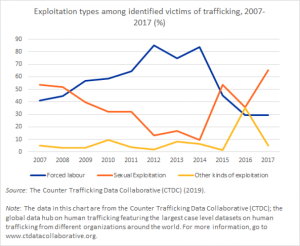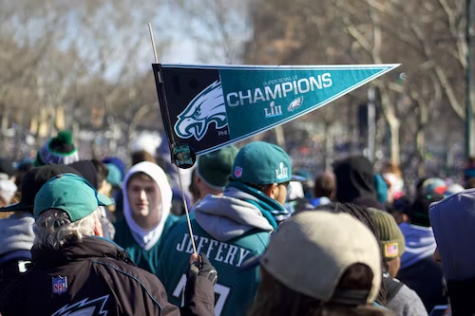Human Trafficking: The Silent Pandemic

March 6, 2023
Post-Emancipation Proclamation, the view of many in America is that slavery is an issue in our rearview. Contrarily, there are more individuals in captivity in 2023 than ever before.
According to the International Labour Association, 1 in 150 individuals worldwide are experiencing some form of modern slavery. This includes sex trafficking, arranged marriages, forced labor and the rarely considered culprit, state imposed forced labor.
Victims range from the slave laborers in Dubai that made the World Cup possible to immigrants in the UK who can’t get legal employment and are forced into more problematic sectors of the economy.

The numbers equal roughly 50 million people globally. For comparison, in 1850, the United States, at the peak of chattel slavery, had 3,204,314 persons in shackles.
So, what is the reason for these astronomical numbers? One major factor has been COVID; the pandemic was one of the largest upward transfers of wealth historically. This transfer left many underserved peoples in even more precarious situations.
COVID disrupted anti-slavery efforts due to social distancing protocols/quarantines, worsened discrimination against immigrants and minorities entering countries and rendered many unemployed, putting them at a higher risk for exploitation.
In America, our main input into the statistics come from our astronomical prison population and sex trafficking. As of 2022, the United States had an incarcerated population of roughly 2 million, roughly ⅕ of the world’s prison population. Now, of course just being in prison is not slavery, but the laissez-faire approach to regulating working conditions for those with jobs and the corruption of prison guards creates a brutal environment.
As disgusting as that is, most Americans are cognizant of mass incarceration and the exploitation of inmates. Sex trafficking goes largely unnoticed, though, frequently happening in plain sight .

The amount of sex trafficked peoples in America is between 15,000 and 50,000. Exact statistics are not easily uncovered due to the nature of trafficking itself. The majority of our trafficking is sexual- rather than labor-oriented.
Brad Dennis is a Navy veteran with 37 years of experience in looking for missing persons. His focus has been on combating human trafficking since his first exposure to the issue in 2005. He and his team run searches for missing children. Brad himself heads the Pensacola-based Called2Rescue, and, combined with Free International, they work across the country, locating exploited peoples and communicating with local law enforcement agencies to focus efforts.
Dennis’ Called2Rescue has helped free over 1,400 children since September of 2015. In an interview for Voyager, Mr. Dennis offered his insight into multiple aspects of trafficking.
 “If you go into a service industry, going to a nail salon, beauty salon, and the people working there are not making eye contact with you, communicating with you, if they’re deferring to someone else, that could be a sign,” said Dennis. “It could be I’m checking into a hotel and in front of me is an adult woman with three or four other girls of different ages checking into a room … there could be a room down the hall from you with people coming in and out all hours.”
“If you go into a service industry, going to a nail salon, beauty salon, and the people working there are not making eye contact with you, communicating with you, if they’re deferring to someone else, that could be a sign,” said Dennis. “It could be I’m checking into a hotel and in front of me is an adult woman with three or four other girls of different ages checking into a room … there could be a room down the hall from you with people coming in and out all hours.”
The hospitality and service industries as a whole have demonstrated an ability to be exploited for trafficking. In a 2022 sting operation, Florida law enforcement arrested 108 individuals, including four Disney World employees.
Businesses like massage parlors and nail salons, along with hotels and motels, are some of the biggest hubs of trafficking. There have even been instances of front desk attendants and hospitality employees turning a blind eye to the practices; some have even been shown to be involved themselves.
Beyond the involvement of businesses, large events, like the Super Bowl, can be associated with sex trafficking spikes as well. According to a 2016 NBC article, events like biker rallies and business conferences can also cause increases, not just sports.
“Certain events that exist out there, like the Super Bowl, you know the Super Bowl is not just a one day event. That’s what most of us think of it as. but it’s really an entire week’s worth of events geared towards men and money,” said Dennis. “When you think about it that way, if you’re in the business of selling women and kids, it’s an obvious conclusion to want to do that there. Unfortunately, it happens all too often.”

According to Dennis, police in Phoenix arrested over 300 people through sting operations during the Super Bowl. Beyond big events, larger cities can be hubs for trafficking, with interstate systems acting as the arteries for transporting victims. Locally, I-10 is viewed as a major corridor for trafficking.
Florida Highway Patrol believes it to be such a big issue that they are asking truckers to educate themselves on the signs of trafficking to bring increased scrutiny for traffickers. With truck stops themselves being prostitution hotspots, truckers are privy to a lot of scenes that the average person, and even law enforcement, get no exposure to.
Even just looking at the amount of high profile cases involving sexual exploitation as of late, it seems nearly every day a new horror story comes out regarding a politician or celebrity. One of the best examples of this would be Jeffrey Epstein and the situation surrounding him.
We can verify figures like Ivanka Trump, Bill Clinton, Prince Andrew, Alec Baldwin, William Dartmouth and The Duchess of York were, at the very least, in contact with Epstein. And this is just a sample of hundreds of names, some of the most powerful people worldwide were privy to his exploits and visited his tropical prison for kids.
 Epstein and his assistants, including Ghislaine Maxwell, would scour communities for those who were in need, targeting those in financial despair or individuals with strained familial relationships. Maxwell would often initiate contact, bringing a dog with her or meeting their victims for tea, charming them with her socialite status and alluring lavish lifestyle. The victims would be told about scholarships and opportunities, only to get taken advantage of in the worst ways in his tropical prison.
Epstein and his assistants, including Ghislaine Maxwell, would scour communities for those who were in need, targeting those in financial despair or individuals with strained familial relationships. Maxwell would often initiate contact, bringing a dog with her or meeting their victims for tea, charming them with her socialite status and alluring lavish lifestyle. The victims would be told about scholarships and opportunities, only to get taken advantage of in the worst ways in his tropical prison.
The abomination that is sex trafficking is increasing in prevalence. In 2011 there were 729 individuals prosecuted for sex trafficking crimes in America.
As of 2020, that number was 1,343, an 84% increase in litigation against criminals involved in sexual exploitation. The problem is a growing one, and with it, we have been able to observe just how far reaching and lucrative the problem has become. Human traffickers manage to profit over $150 billion annually worldwide.
“It’s a growing entity for the criminal nexus as a whole, you would think that drugs is the biggest thing from organized crime to gangs,” said Dennis. “You can only sell that rock once, but that neighborhood girl can be sold again and again.”
The picture painted by the statistics, news stories and law enforcement seems bleak, but there are steps that even you and I can take to combat the issue.
The most important thing we can do is keep our eyes open, as traffickers and their victims are not invisible. There is not a sure fire way to know if someone is a trafficking victim, but signs like malnourishment, uncleanliness, clothing that is inappropriate for weather conditions and deferring to an adult when asked questions can be an indicator.
Law enforcement, no matter how concentrated in their efforts, can’t be everywhere at once, but the general public is, and can observe situations police aren’t able to. You can call the national hotline at 1 (888) 373-7888, get involved with local groups like Called2Rescue, start a club at your college to raise awareness, speak out on social media or share statistics with friends and family.
It takes a village; a strong community is one of the strongest forces to oppose crime of all manners. It’s time to educate ourselves and do what we can to end the exploitation of American children, men and women on a grassroots level. Our brothers and sisters are being subjected to unimaginable trauma, and turning a blind eye makes us as culpable as the criminals themselves.

